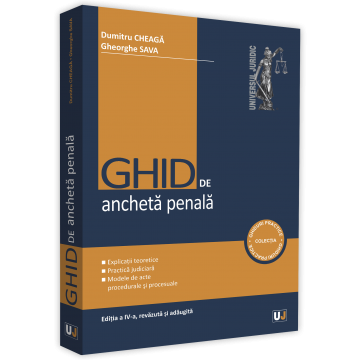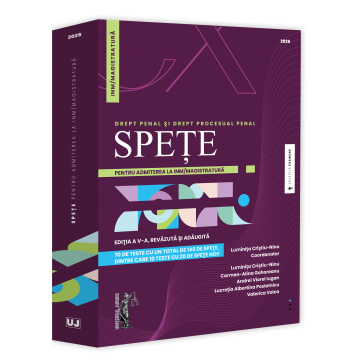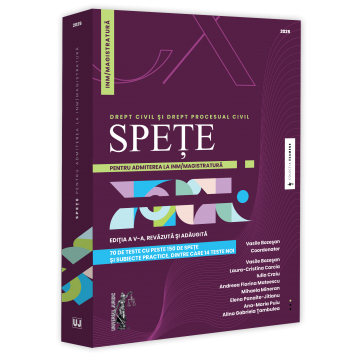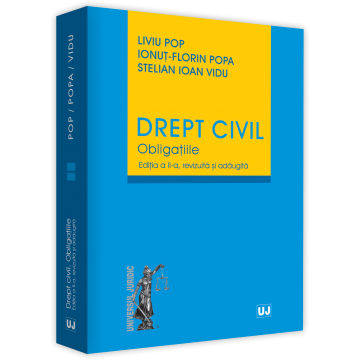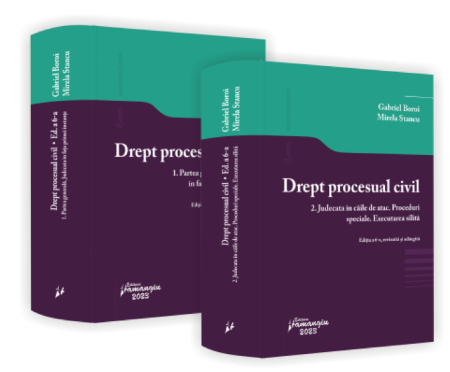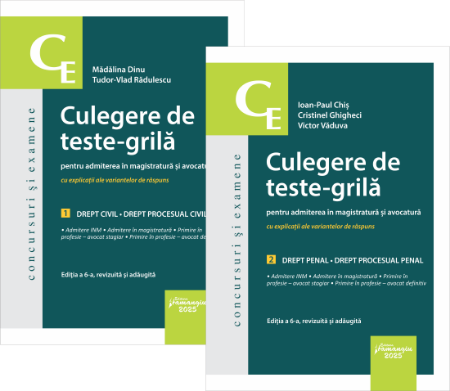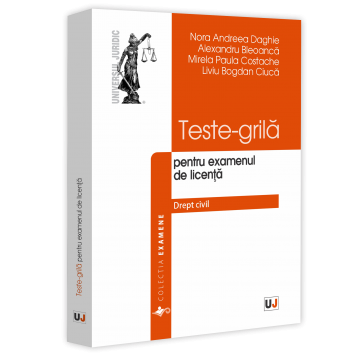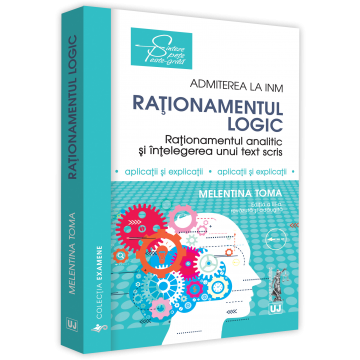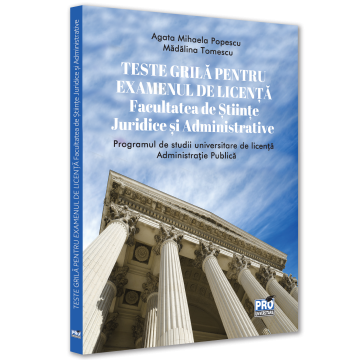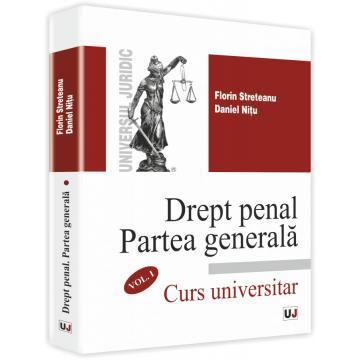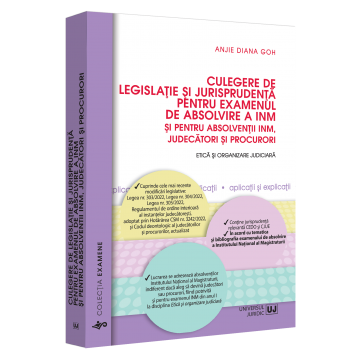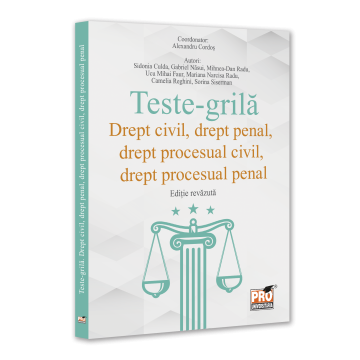ISBN: 978-606-28-0422-0
DOI: 10.5682/9786062804220
Publisher year: 2016
Edition: I
Pages: 178
Publisher: Editura Universitară
Author: Andrei Palade
- Description
- Download (1)
- Authors
- Content
- More details
- Reviews (0)
The history of mankind carries the inexorable truth of the conflicts between its fellows. The contemporary international community is marked by a multitude of conflicts with variable forms and intensities. Unfortunately, these conflicts have a common denominator: committing acts of unspeakable gravity, legally qualified as international crimes. Faced with the most heinous events, the thirst for justice of the international community is trying to be quelled by several legal means of international law. International courts designed to try international crimes have come to benefit from a wide competition, as evidenced by the jewel, still unpolished, of the crown of international courts: the International Criminal Court. There are also ways to bring more controversial justice: when the courts of a state judge deeds committed on other meridians, with completely foreign protagonists. What right does the Madrid Court of Appeal have to decide the fate of a person involved in alleged atrocities in the Himalayas? This paper hopes to answer this question - political springs are sometimes easy to understand, and the legal basis is often weak.
-
Jurisdictia universala asupra crimelor internationale
Download
Andrei Palade has a degree in legal sciences since 2013, being a graduate of Petru Maior University in Tirgu-Mures. Since 2015, he has acquired the status of diplomat within the Romanian Ministry of Foreign Affairs.
CONTENTS / V
TABLE OF CONTENTS / IX
PREFATA / XIII
SUMMARY / XVII
BIBLIOGRAPHY / XXXII
LIST OF ABBREVIATIONS / LXI
1. INTRODUCTION / 1
2. DEFINITION, BOUNDARIES AND DEVELOPMENT OF THE PROBLEM / 4
2.1. The concept of jurisdiction / 4
2.2. The connection between the principles of application of the criminal jurisdiction of the national courts and the public international law / 6
2.2.1. Principles of application in space of the national criminal jurisdiction enshrined in public international law / 7
a. The principle of territoriality / 8
b. The principle of nationality / 9
2.2.2. Universality - a principle with two faces, from two points of view / 11
a. The classical face of the principle of universality / 12
UNIVERSAL JURISDICTION ON INTERNATIONAL CRIMES / VI
b. The modern face of the principle of universality / 14
c. Universality from the perspective of international and national courts - the other two girls / 18
2.2.3. The relationship between domestic law and international law - outlining a possible consequence / 24
Implementation of international law in the domestic law system / 24
Carrying out the stages until the responsibility of the state - a possibility / 37
2.3. Universal jurisdiction of national courts in relation to the sources of international law - restricted or extended law / 48
2.3.1. Universal jurisdiction in treaties - typical of restricted norms, up to one point / 50
a. Universal jurisdiction in conventions / 50
b. A possible transition from typical to atypical / 54
2.3.2. Evaluation of universal jurisdiction in the light of international custom / 56
2.3.3. International court decisions and doctrine - a mirror of practice? / 60
3. LEGALITY OF UNIVERSAL JURISDICTION / 62
3.1. Jurisdictional clauses of treaties which are presumed to have acquired customary status / 62
3.1.1. Convention on Genocide / 62
a. Interpretation of the text of Article VI / 64
b. National causes - a possible reinterpretation? / 65
c. International causes - a conflict of views? / 68
d. Conclusion on the universal jurisdiction of national courts over genocide / 70
3.1.2. Geneva Conventions / 72
a. Interpretation of the common jurisdictional clause / 74
b. The practice of states / 76
c. Conclusion on the universal jurisdiction of national courts for war crimes - pure universal jurisdiction? / 78
3.1.3. Convention against Torture / 79
a. Interpretation of the jurisdictional clause / 81
b. The practice of states / 84
c. The evasive position of the International Court of Justice / 86
d. Conclusion on the universal jurisdiction of national courts over torture / 89
3.2. Significant moments in the life of the international community / 92
3.2.1. Belgium / 93
a. A euphoric beginning / 93
b. The settlement expected by the reaction of other states / 94
3.2.2. Israel / 96
a. Eichmann cases / 96
b. Israel's Reactions to Attempts to Exercise Universal Jurisdiction by Other States / 97
3.2.3. Spain / 99
a. Another attempt at absolute universality / 99
b. Current situation / 100
UNIVERSAL JURISDICTION ON INTERNATIONAL CRIMES
3.2.4. United States of America / 101
a) The case of Demjanjuk v. Petrovsky / 101
b. Behavior internationally / 102
3.2.5. African continent / 103
3.2.6. Latin America / 104
3.2.7. A brief look at the universal jurisdiction regulated in the Romanian Criminal Code / 106
4. FINAL OBSERVATIONS / 111
4.1. Existence of the customary norm onerative or permissive of universal jurisdiction for international crimes - no (for the time being) / 111
4.1.1. Geographical distribution of state practice - geographical inequality and influence / 111
4.1.2. The practice of multilateral treaties does not prove the crystallization of a custom that obliges states to exercise universal jurisdiction / 114
4.1.3. Sovereign equality does not represent a derogation from the peremptory norm of prohibition of international crimes / 116
The monographic paper Universal Jurisdiction over International Crimes is a study of the strongest and perhaps most modern, at the same time, forms of reaction of the international community to armed events in the context and on the occasion of which atrocities were committed. The author starts his approach by identifying the origins of the international criminal jurisdiction, his interest focusing on the need to exercise a universal jurisdiction in case of piracy, this being the situation at the origin of the principle of universal repression of international crimes. The presentation of the origins of international jurisdiction aims to clearly highlight that the exercise by national courts of universal jurisdiction appears as a natural and legitimate extension of public international law. The same idea is pursued by the author in the following sections, given that the historical arguments consider them insufficient in themselves to justify a universal jurisdiction in the case of facts whose characteristics are different in relation to piracy. In order to reach a more pertinent conclusion, the author points out all the distinctions necessary for the conceptual identification of the universal jurisdiction exercised by national courts over international crimes, in order to later appreciate that "universal jurisdiction of international tribunals is more natural" than that of national courts. However, the author highlights the idea that underlying the exercise of universal jurisdiction over international crimes by national courts is a primary legitimacy generated by the atrocity of these acts, some crimes being so outrageous that any state has a legitimate interest in punishing them. .
The paper is distinguished not only by the fact that it offers an overall and well-documented scientific perspective, but also by the fact that it responds to pertinent hypotheses characterized by the paradigm of international law-domestic law. One of these answers concerns the situation in which a national court exercises universal jurisdiction but thus generates an international conflict, followed by the need to resolve it and, eventually, to establish international legal liability. The hypothesis highlights the fragile, complex and delicate character of the exercise of universal jurisdiction by the national courts, the issue being treated in the beginning of the paper in the context of the legitimacy of the exercise of such jurisdiction. In the beginning, at the same time, the author rightly raises the question of the precision of the source (source) of international law that legitimizes, on a case-by-case basis, the exercise of universal jurisdiction. It is natural to proceed in this way, even if, after realizing that in the field the research must take into account the reality, he concludes that there is a "The main force representing the conscience of international civil society that has led to a gradual reconsideration of the jurisdictional boundaries of members of the international community."
Thus, the author, after the introductory part, suddenly enters the main question: what is the legitimacy of the national courts to try international crimes on the basis of universality? The answer to such a question is based on the law in force, as it is based on conventional, customary and doctrinal law, meaning that the position of the International Court of Justice in the case of Reservations to the Convention on Genocide is relevant: the high ideals underlying it. to that convention were born principles which were recognized by civilized nations as binding on states, even in the absence of a conventional norm. Examples of the exercise of universal jurisdiction by national courts, such as in Eichman or Jorgić, are well articulated in the paper, so that the reader can observe not only the considerations which led to such an exercise of national jurisdiction but also the issues that the courts faced, some of which remained controversial. In fact, I believe that the paper has a high quality, especially because it manages to place a national issue (exercising the jurisdiction of national courts) in the appropriate international context.
The analysis of the exercise of universal jurisdiction continues with the other categories of international crimes, namely war crimes, crimes against peace and humanity, terrorism, torture. Each of them is analyzed from a conventional and customary perspective, and the conclusions taking into account the most authoritative opinions, such as those of the International Court of Justice or the Red Cross. Finally, it is concluded that, unlike genocide, where the separate existence of the conventional norm of the Convention on Genocide, which establishes the jurisdiction of the state, can be discussed. or on a traditional basis, and a customary norm that allows the exercise of universal jurisdiction of national courts for genocide, in the case of war crimes we can observe a content identity between the conventional norm in the form of the common jurisdictional clause of the Geneva Conventions and a possible permissive customary norm. even onerative of universal jurisdiction in the case of war crimes. In the case of torture, the customary obligation to prohibit acts of torture is not “accompanied” by the possibility of exercising universal jurisdiction by national courts, this possibility being limited to the conventional obligations assumed by states through the Convention against Torture.
The most exciting chapter of the paper is the one regarding moments in the life of the international community on the universal jurisdiction, whose objective is in reality to highlight the existence / non-existence of an opinion iuris or a practice of the states. This chapter highlights the existence of a privileged position of developed states in relation to other states and, on the other hand, an additional responsibility that the former have. Precisely for this reason, the author concludes his work by concluding that in an era in which the individual and the need to correct the injustices suffered by individuals becomes an increasingly important factor in the system of international law, universal jurisdiction still functions, in essence, under the paradigm of classical international law.
Dr. Nicolae-Dragos Ploesteanu

6359.png)
![Universal jurisdiction over international crimes [1] Universal jurisdiction over international crimes [1]](https://gomagcdn.ro/domains/editurauniversitara.ro/files/product/large/jurisdictia-universala-asupra-crimelor-internationale-623-619807.jpg)
